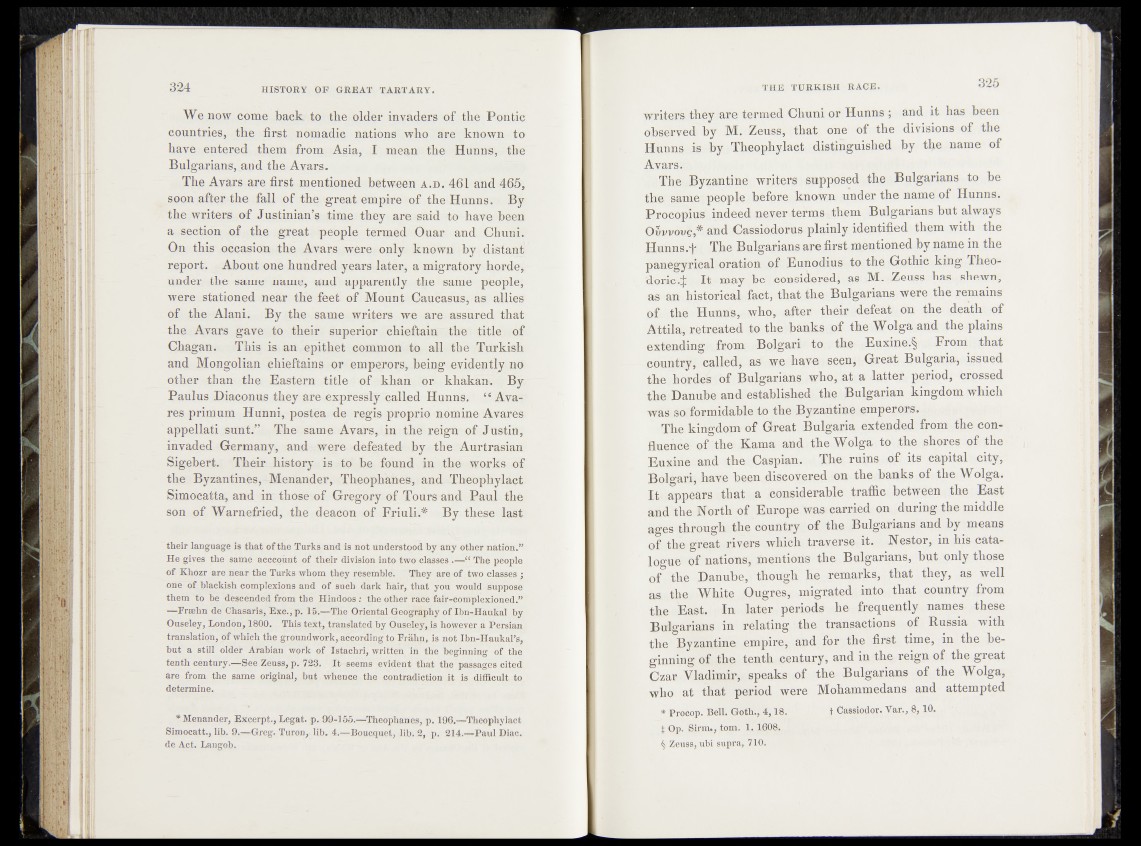
We now come back to the .older invaders of the Pontic
countries, the first nomadic nations who«/are^fkno.wn to
have entered them * from Asia, I mean the Hunns, the
Bulgarians,jand the Avars.
The Avars are first mentioned between a4b. 461 and 465,
soon after the fall of the great empire of the Hunn^ k By
the writers of Justinian’s time they are said -to havef.beeni
a Section of the great people termed Ouar and Chuni.
On this occasion the Avars .were only known byydistant
report. About ©ne hundred yearsdater, a migratory horde,
under, the same name, and apparently the same people;
were stationed near the feet of Mount Caucasm^ as allies
of the Alani. By the same writers we are assured, that
the Avars gave to their superior chiefteiaîFIthe: till© of
Chagan. This is an epithet common to all the Turkish
and Mongolian chieftains or emperors, being evidently no
other than the Eastern title of khan or khakan. By
Paulus Diaconus they are expressîÿTealled Hunnâ. “ Avüf1
res primum Hunni, posfiea d©; r^ is proprimmomine Avares
appellati sunt.” The same Avars, in the reign of Justin;
invaded Germany, and were defeated by the Aurtrasian
Sigebert. Their history is to he found in the works of
the Byzantines, Menander, Theophahes, and Theophylact
Simocatta, and in those of Gregory of Tours and Paul t-Jie
son of Warnefried, the deacon of Friuli.# By these last
their language is that of the Turks and is not understood by any otfefer nation^-
He gives the same - acecount of their division into two classes The people
of- Khozr are near the Turks whom they resemble.“ T?hey are of classes;
oArof blackish complexions and of suelr dark hair, that you would # ip ^ p #
them to be descended from the Hindoos: the other race fair-conrplexioned A
—Prsehn de Chasaris, Exc., p. 15.—The Oriental Geography of Ibn-Haukal by
Ouseley, London, 1800., This text, translated by Ouseley, is however a Persian
translation, of which the groundwork, aifdorjiing to Frahp, is not Ibn-Haukal’g,
but a still oldelf Arabian work of Istachri, written in ihe beginning of the
tenth century.—See Zeuss, p. 723. I t seems evident that the passages cited
are from the same original, but whence the contradiction it is difficult to
determine.
•Menander, Excerpt.,Legat. p. 99-155.—Theophanes, p. 100.—Theophylact
Simocatt., lib. 9.—Greg. Turon, lib. 4.—Boucquet, lib. 2, p. 214.—Paul Diac.
de Act. Langob.
writers -they are termed- Ghuni or Huims; and it has been
ob^ervfedf.^^i M. Zeuss, that one of the divisions of the
Hunns p^'by Theophylact distinguished by th.e name of
Avars/..
The^Byzantine wrjters, supposed the Bulgarians to be
the same people before known ;under the name of Hunns.
Procopius in-deedaever terms wthejai Bulgarians but always
0 and, jOassiodorus plainly identified them with the
The Bulgarians are first mentioned by name in the
panegyrical oration of Eu-nodilus^te^the Gothic king Theo-
donic.J It may considered, as M.-,^eu;ss has shewn,
as an historical fabjt, that-fhe Bulgarians were the remains
of the Hunng,--who, after their defeat on the death of
Attila, retreated #o the banks, of the W ©Iga and the plains
extending jfrom . Bolgari? t-p , the Euxine.^w From that
country, called* as we have.seen, Great Bulgaria, issued
the hordes of, Bulgarians who, at a latter period, crossed
the Danube and established the Bulgarian kingdom which
was so fprmidahle to stke Byzantine emperors.
The kingdom of Great Bulgaria extended from the confluence
of the Kama and the Wolga.to the shores of the
Euxine and the Caspian. The ruins of its capital city,
Bolgari, have been discovered on tbe banks of the Wolga.
It appears that a considerable traffic between., tbe East
and the North of Europe was carried on during tbe middle
ages through the country of the Bulgarians and by means
of the great rivers which traverse; it. Nestor, in his catalogue
of nations, mentions the Bulgarians, hut only those
of the Danube, - though he remarks, that they, as well
as the White Ougres, migrated into that country from
the East. In -later periods he frequently names these
Bulgarians in relating the transactions of Russia with
the Byzantine empire, and for the first time, in the beginning
of tbe tenth century, and in the reign of the great
Czar Vladimir, speaks of the Bulgarians of the Wolga,
who at that period were Mohammedans and attempted
* Procop. Bell. Goth., 4,18. J Cassiodor. Var., 8,10.
$ Op. Sirm., tom. 1.. 1608.
§ Zeuss, ubi supra, 710.